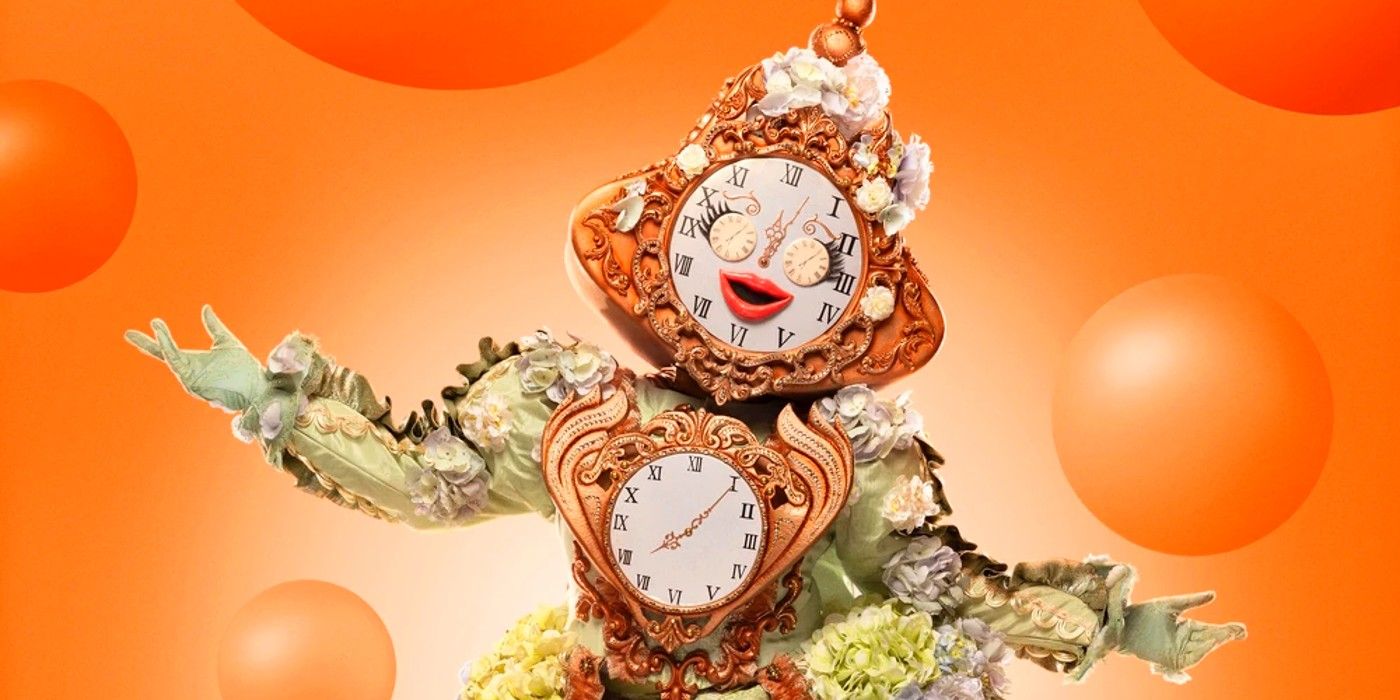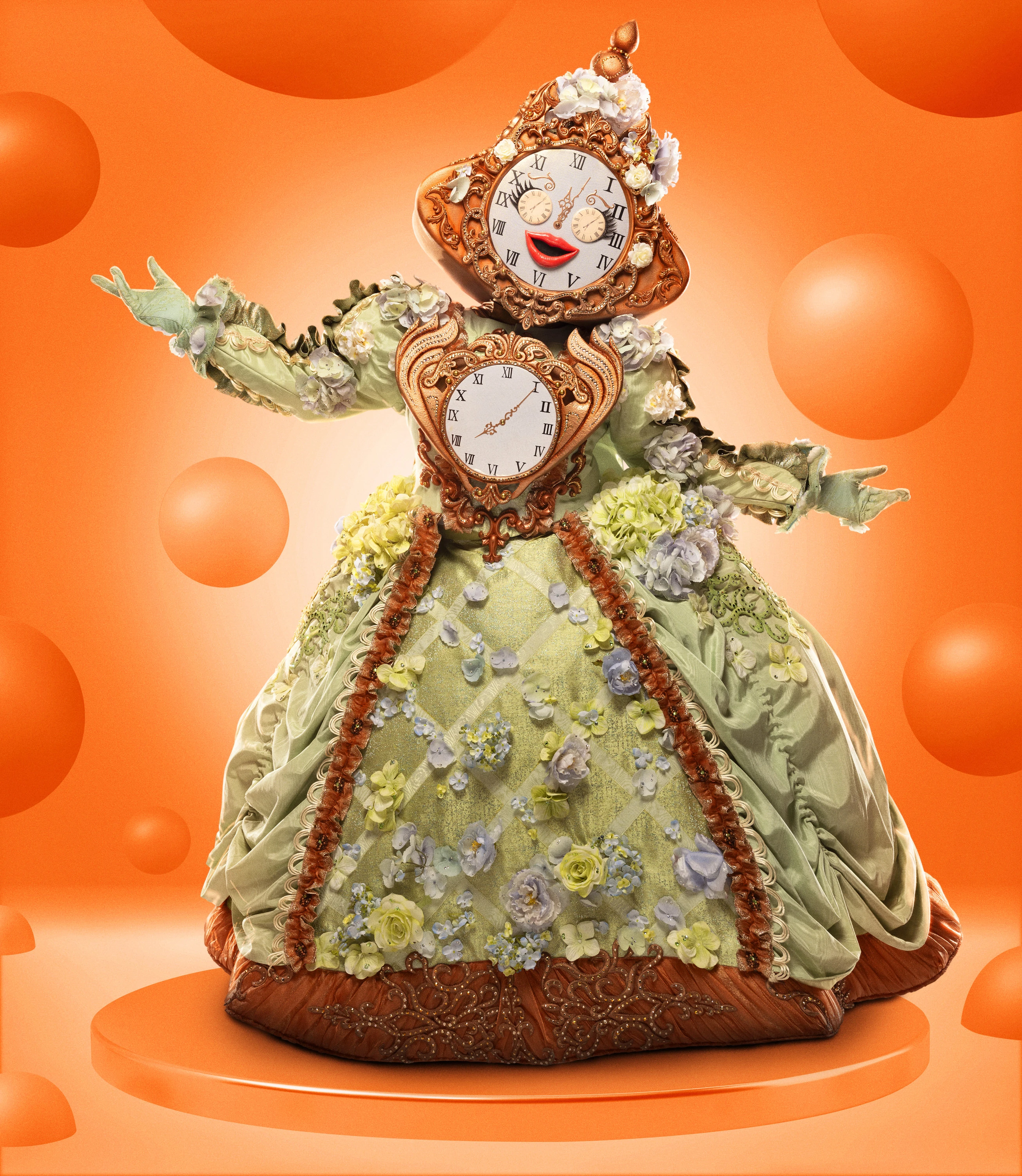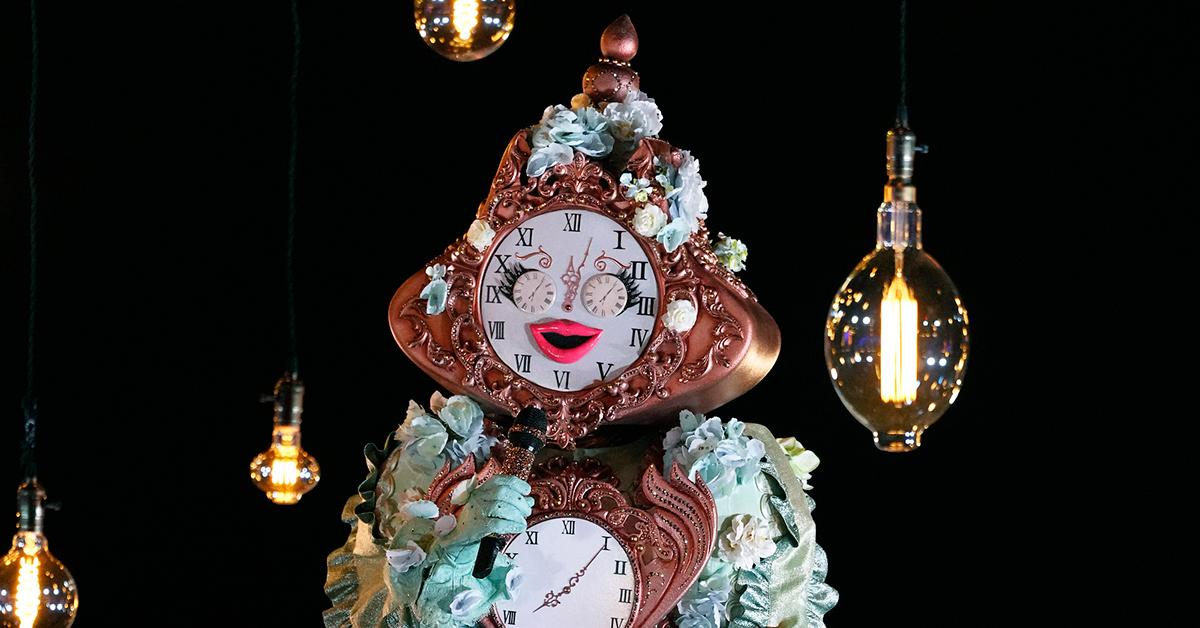What exactly is the "clock on masked singer"?
The "clock on masked singer" is a term used to describe the moment when a panelist on the popular TV show "The Masked Singer" correctly guesses the identity of a celebrity contestant based on their clues and performance.
The term "clock" is often used in the context of identifying someone or something, and in this case, it refers to the moment when the panelist has a sudden realization or "aha" moment and figures out who the celebrity is.
- Mark Harmons Date Of Birth Explore The Life And Career Of The Renowned Actor
- The Latest On Zendaya Coleman And Tom Hollands Proposal Rumors
Getting the "clock" on the masked singer is considered a major accomplishment for the panelist, as it demonstrates their ability to read clues, interpret performances, and make accurate deductions.
clock on masked singer
Introduction
There are several key aspects that contribute to a successful "clock on masked singer":
- Attention to detail: The panelist must pay close attention to the clues and performances provided by the celebrity contestant.
- Analytical skills: The panelist must be able to analyze the clues and performances to identify patterns and make connections.
- Knowledge of pop culture: The panelist must have a broad knowledge of pop culture in order to recognize the celebrity contestant's voice, mannerisms, and other identifying characteristics.
- Intuition: Sometimes, the panelist may have a gut feeling or intuition about who the celebrity contestant is, which can lead to a successful "clock."
{point}
Getting the "clock" on the masked singer is important for several reasons:
- Mark Wahlbergs Towering Presence Unveiling His Height
- The Unforgettable Life And Legacy Of Gymnastics Legend Olga Korbut
- It demonstrates the panelist's skills: A successful "clock" shows that the panelist is intelligent, observant, and has a deep understanding of pop culture.
- It helps the audience: When the panelist correctly guesses the identity of the celebrity contestant, it helps the audience to feel like they are part of the guessing game and makes the show more enjoyable.
- It adds to the excitement: The "clock" moment is one of the most exciting parts of the show, and it helps to keep the audience engaged.
{point}
There are several things you can do to improve your chances of getting the "clock" on the masked singer:
- Pay attention to the clues: The clues are essential to figuring out who the celebrity contestant is, so make sure to pay close attention to them.
- Analyze the performances: The celebrity contestant's performance can also provide clues to their identity, so make sure to analyze their body language, mannerisms, and voice.
- Do your research: If you're not familiar with a particular celebrity, do some research on them before the show so that you can be more familiar with their voice and mannerisms.
- Trust your gut: Sometimes, you may have a gut feeling about who the celebrity contestant is. If you have a strong feeling, go with it!
clock on masked singer
The "clock on masked singer" is a term used to describe the moment when a panelist on the popular TV show "The Masked Singer" correctly guesses the identity of a celebrity contestant based on their clues and performance.
- Analytical: Breaking down clues and performances to uncover patterns and connections.
- Observational: Paying close attention to details in performances and physical characteristics.
- Deductive: Drawing logical conclusions based on the available information.
- Intuitive: Relying on gut feelings or sudden realizations to identify the celebrity.
- Pop Culture-Savvy: Possessing a deep knowledge of entertainment and celebrity culture.
These key aspects are crucial for panelists to successfully "clock" the masked singer. By carefully analyzing clues, observing performances, and drawing logical conclusions, panelists can increase their chances of correctly identifying the celebrity contestant. Additionally, a strong understanding of pop culture and the ability to trust one's intuition can be invaluable assets in this challenging but exciting game.
Analytical
When it comes to "clocking" the masked singer, analytical thinking is key. Panelists must be able to break down the clues and performances provided by the celebrity contestant in order to uncover patterns and connections that can lead to their identity.
- Identifying Vocal Patterns:
Panelists can analyze the contestant's vocal patterns, such as pitch, tone, and diction, to identify similarities with known singers. By comparing these patterns to their knowledge of celebrity voices, they can narrow down the possibilities. - Deconstructing Physical Clues:
The masked singer's costume and stage presence can also provide valuable clues. Panelists must pay attention to the contestant's body language, mannerisms, and any distinctive physical features that may match those of a particular celebrity. - Connecting Performance Style:
The way the contestant performs can reveal insights into their identity. Panelists can examine the contestant's stage presence, dance moves, and overall performance style to find connections with the known performance styles of specific celebrities. - Analyzing Song Selection:
The songs that the contestant chooses to perform can also be revealing. Panelists can consider the genre, lyrics, and overall tone of the songs to identify potential matches with the musical preferences or repertoire of particular celebrities.
By breaking down clues and performances in this analytical manner, panelists can uncover patterns and connections that help them to identify the masked singer. This analytical approach is essential for successfully "clocking" the masked singer and adds to the excitement and intrigue of the show.
Observational
In the context of "clocking" the masked singer, observational skills are paramount. Panelists must be able to pay close attention to details in performances and physical characteristics in order to identify clues that can lead to the celebrity contestant's identity.
Observational skills are crucial for several reasons:
- Identifying Physical Similarities: By closely observing the masked singer's physical characteristics, such as body shape, height, and facial features, panelists can compare them to known celebrities to identify potential matches.
- Analyzing Stage Presence: The way the masked singer moves on stage, interacts with the audience, and performs can provide valuable clues. Panelists must be observant of these details to identify mannerisms or stage presence that match those of specific celebrities.
- Detecting Vocal Nuances: While the masked singer's voice is disguised, subtle nuances such as vocal range, pronunciation, and speech patterns can still be detected. Observant panelists can use these nuances to match the contestant's voice to known celebrities.
- Noticing Costume Details: The masked singer's costume can also provide clues. Observant panelists can pay attention to the design, colors, and any unique details that may hint at the celebrity's identity or interests.
By paying close attention to details in performances and physical characteristics, panelists can gather valuable clues that help them to "clock" the masked singer. These observational skills are essential for successfully identifying the celebrity contestant and add to the excitement and intrigue of the show.
Deductive
Deductive reasoning plays a crucial role in "clocking" the masked singer. By drawing logical conclusions based on the available information, panelists can narrow down the possibilities and identify the celebrity contestant.
- Eliminating Possibilities: Panelists can use deductive reasoning to eliminate celebrities who do not match the clues or physical characteristics of the masked singer. For example, if the contestant is a tall male with a deep voice, panelists can eliminate female celebrities or celebrities who are known to be shorter.
- Identifying Commonalities: Panelists can also use deductive reasoning to identify commonalities between the clues and the known characteristics of celebrities. For example, if the contestant performs a song from a particular musical genre, panelists can consider celebrities who are known for that genre.
- Making Connections: Deductive reasoning allows panelists to make connections between different pieces of information. For example, if the contestant mentions a specific hobby or interest in a clue, panelists can connect that information to celebrities who are known for that hobby or interest.
- Drawing Conclusions: Ultimately, panelists use deductive reasoning to draw conclusions about the identity of the masked singer. By combining the clues, physical characteristics, and logical deductions, panelists can make informed guesses about who the celebrity contestant is.
Deductive reasoning is a fundamental skill for panelists on "The Masked Singer." By drawing logical conclusions based on the available information, panelists can increase their chances of correctly identifying the celebrity contestant and contributing to the excitement and intrigue of the show.
Intuitive
In the context of "clocking" the masked singer, intuition plays a significant role in helping panelists identify the celebrity contestant. Intuition can be described as a sudden feeling or realization that leads to a conclusion or decision, often without conscious reasoning.
- Gut Feelings: Panelists may experience a gut feeling or hunch about the identity of the masked singer based on their overall performance, stage presence, or other subtle cues. These gut feelings can sometimes lead to accurate guesses.
- Sudden Realizations: During or after a performance, panelists may experience a sudden realization or moment of clarity that reveals the celebrity's identity. These realizations can be triggered by a specific clue, a vocal similarity, or a physical characteristic that resonates with the panelist's knowledge of celebrities.
- Subconscious Processing: Intuition in this context often involves subconscious processing of information. Panelists may subconsciously gather and analyze clues and details throughout the performance, leading to a sudden realization or gut feeling.
- Experience and Expertise: Panelists with extensive experience in the entertainment industry or with a deep knowledge of celebrity culture may have developed stronger intuitive abilities. Their familiarity with celebrity voices, mannerisms, and performance styles can enhance their ability to make intuitive connections.
While intuition cannot be relied upon solely to identify the masked singer, it can be a valuable asset for panelists. By trusting their gut feelings and sudden realizations, panelists can increase their chances of making accurate guesses and contribute to the excitement and intrigue of the show.
Pop Culture-Savvy
In the context of "clocking" the masked singer, possessing a deep knowledge of entertainment and celebrity culture is a crucial asset for panelists. This pop culture savvy enables them to draw connections and make informed guesses based on the clues and performances presented by the celebrity contestants.
- Recognizing Vocal Nuances:
Panelists with a deep understanding of celebrity voices can identify subtle nuances and vocal characteristics that match those of known singers. This allows them to narrow down the possibilities and make more accurate guesses. - Identifying Performance Styles:
Pop culture savvy panelists can recognize the performance styles and stage presence of various celebrities. By observing the masked singer's mannerisms, dance moves, and overall stage presence, they can make connections to specific celebrities known for their distinctive performance styles. - Understanding Celebrity Backgrounds:
A deep knowledge of celebrity backgrounds, including their musical influences, past performances, and personal interests, can provide valuable clues for panelists. By connecting the clues to known celebrity backgrounds, they can increase their chances of correctly identifying the masked singer. - Staying Up-to-Date with Current Trends:
Pop culture savvy panelists are constantly aware of current trends in entertainment and celebrity culture. This knowledge allows them to make connections to recent events, popular songs, or emerging celebrities, which can provide valuable clues for identifying the masked singer.
Overall, possessing a deep knowledge of entertainment and celebrity culture is essential for panelists on "The Masked Singer." By leveraging their pop culture savvy, they can analyze clues, make connections, and draw informed conclusions, increasing their chances of successfully "clocking" the masked singer and contributing to the excitement and intrigue of the show.
FAQs on "Clocking the Masked Singer"
This section addresses frequently asked questions and clarifies common misconceptions surrounding the concept of "clocking the masked singer" in the popular TV show.
Question 1: What exactly is meant by "clocking the masked singer"?
Answer: Clocking the masked singer refers to the moment when a panelist on the show correctly guesses the identity of a celebrity contestant based on clues and performances, often through a sudden realization or "aha" moment.
Question 2: What are the key factors that contribute to successfully clocking the masked singer?
Answer: Key factors include analytical skills, observational abilities, deductive reasoning, intuition, and a deep knowledge of entertainment and celebrity culture. Panelists must carefully analyze clues, observe performances, draw logical conclusions, and trust their gut feelings to increase their chances of making accurate guesses.
In summary, clocking the masked singer requires a combination of analytical thinking, keen observation, logical reasoning, and a strong understanding of pop culture and celebrity culture. By leveraging these skills and knowledge, panelists contribute to the excitement and intrigue of the show by correctly identifying the hidden celebrities.
Conclusion
Clocking the masked singer is a complex and challenging task that requires a combination of analytical thinking, observational skills, deductive reasoning, intuition, and a deep knowledge of entertainment and celebrity culture. Panelists on the show must carefully analyze clues, observe performances, draw logical conclusions, and trust their gut feelings in order to correctly identify the hidden celebrities.
The ability to clock the masked singer is not only entertaining but also demonstrates the panelists' intelligence, analytical abilities, and pop culture savvy. It adds to the excitement and intrigue of the show, keeping the audience engaged and eager to discover the true identities of the masked singers.



Detail Author:
- Name : Mr. Osborne Stark V
- Username : adonis84
- Email : edna86@yahoo.com
- Birthdate : 1980-08-31
- Address : 3022 Hill Walks Suite 039 West Malvinaville, NJ 53098-8521
- Phone : (985) 654-5175
- Company : Orn, Stark and Feeney
- Job : Pipelaying Fitter
- Bio : Atque non id architecto enim. Ut eos accusantium quia voluptas sit. Est sunt aspernatur at unde et alias. Sint odio enim vero qui ipsam enim et hic.
Socials
instagram:
- url : https://instagram.com/acormier
- username : acormier
- bio : Iste ea aut accusantium. Ad quia incidunt temporibus magni qui ut. Et id iste sunt sunt magni.
- followers : 1152
- following : 2014
tiktok:
- url : https://tiktok.com/@cormiera
- username : cormiera
- bio : Quos earum maxime ut error quo velit eum.
- followers : 413
- following : 2617
facebook:
- url : https://facebook.com/armani_cormier
- username : armani_cormier
- bio : Et animi voluptates et quos et.
- followers : 532
- following : 2802
linkedin:
- url : https://linkedin.com/in/armani_id
- username : armani_id
- bio : Quae animi architecto vero modi ex est et.
- followers : 2521
- following : 1235
twitter:
- url : https://twitter.com/cormiera
- username : cormiera
- bio : Et magnam atque illo vel iste. Ab est quia sit et enim. Similique sit quis est reiciendis quasi. Quidem unde veritatis neque id eaque aut cupiditate.
- followers : 2265
- following : 1847